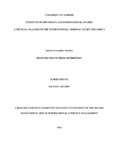| dc.description.abstract | This study seeks to examine the International criminal Court as an international legal regime, The
study appreciates that international Crimes are so serious that no perpetrator should be allowed to
go scot free and that for the international court to succeed it needs cooperation from all states
whether they are member states or not to put an end to impunity and the fact that conflicts spill
over.
The objective of the study is to examine the basis of having the International Criminal Court, the
criminal cases from different states before the ICC and how Kenyan cases ended up at the ICC,
despite being given ample opportunities to put up a special tribunal to try the perpetrators of the
Post Election Violence. The study will use the theory of realism which states, that states are driven
by their own interests and that international law is not law because the international system has no
Government and no institutions of Government on which law depends on, no legislature to make
law, no executive to enforce, no judiciary to resolve disputes and develop the law. The
methodology of the study entails both primary and secondary data sources. The primary sources are
content analysis of the court decisions issued by the ICC and other courts concerning international
crimes.
The study finds that the International Criminal Court has a role to play, in ending impunity since
most states are not willing to prosecute perpetrators of these crimes, that the ICC is the only hope of
victims of these heinous crimes, states are not willing to cooperate with the ICC and are not willing
to prosecute international crimes under the Rome Statute. However it notes that there are some
issues that need to be addressed by the ICC and the United Nations Security Council and the United
Nations General assembly, so that all matters are given the same considerations or determined on a
case to case basis. The study further demonstrates that there is need to address the root causes of the
conflict. | en_US |

